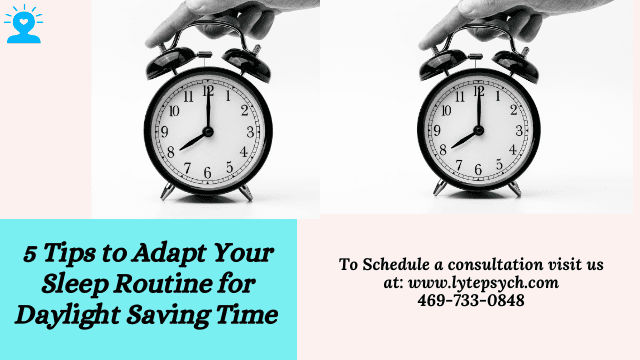Fri Mar 07 2025
5 Tips to Adapt Your Sleep Routine for Daylight Saving Time at Lyte Psychiatry (Affordable Therapist and Psychiatrist Near You), Best Adults and Adolescents Therapist and Psychiatrist Near You, Dallas, TX

5 Tips to Adapt Your Sleep Routine for Daylight Saving Time at Lyte Psychiatry (Affordable Therapist and Psychiatrist Near You)
Below are five tips to help you adapt your sleep routine—and how Lyte Psychiatry can support you every step of the way.
1. Make Gradual Adjustments
Start going to bed and waking up 10–15 minutes earlier (or later, depending on the season) a few days before the official time change. Small daily shifts can help your body acclimate more smoothly.
2. Limit Screen Time Before Bed
3. Stick to a Consistent Schedule
4. Take Advantage of Morning Light
5. Practice Relaxation Techniques
Schedule an Appointment at Lyte Psychiatry (Affordable Therapist and Psychiatrist Near You) Dallas, TX.
If you’re struggling to manage disrupted sleep or heightened stress around Daylight Saving Time, reach out to Lyte Psychiatry for compassionate, tailored support. We’re proud to offer affordable care for both adults and adolescents in Dallas, TX—so you can find the help you need, right in your neighborhood.
Ready to ease into Daylight Saving Time without losing sleep? Get in touch with Lyte Psychiatry in Dallas, TX. Our team is here to guide you toward better rest and a healthier mindset, no matter the season!
To see our services. Click Here
To Schedule an Appointment. Click Here
Call us if you have questions at 469-733-0848
FAQ: Frequently Asked Questions
Q: How long does it usually take to adjust to the time change?
A: Most people adapt within a week or two, but it can vary depending on your sleep habits and sensitivity to schedule changes.
Q: Can I just rely on sleeping in when the clock changes?
A: Sleeping in might feel good short-term, but keeping a consistent schedule is more effective for long-term sleep quality.
Q: Does changing my diet help with Daylight Saving Time adjustments?
A: A balanced diet can support better sleep. Avoid heavy meals and caffeine close to bedtime for a smoother transition.
Q: What if my teenager is struggling to adjust?
A: Teens often have unique sleep cycles. Encouraging a regular bedtime, reducing late-night screen time, and seeking professional guidance if needed can help.
Q: I already deal with insomnia. Will Daylight Saving Time make it worse?
A: It can exacerbate existing issues. If you’re concerned, consider reaching out to a mental health professional for specialized advice.
Q: How do I schedule an appointment with Lyte Psychiatry?
A: Simply give us a call or visit our website to book a session. We’ll help you navigate insurance or payment options and connect you with the right provider.